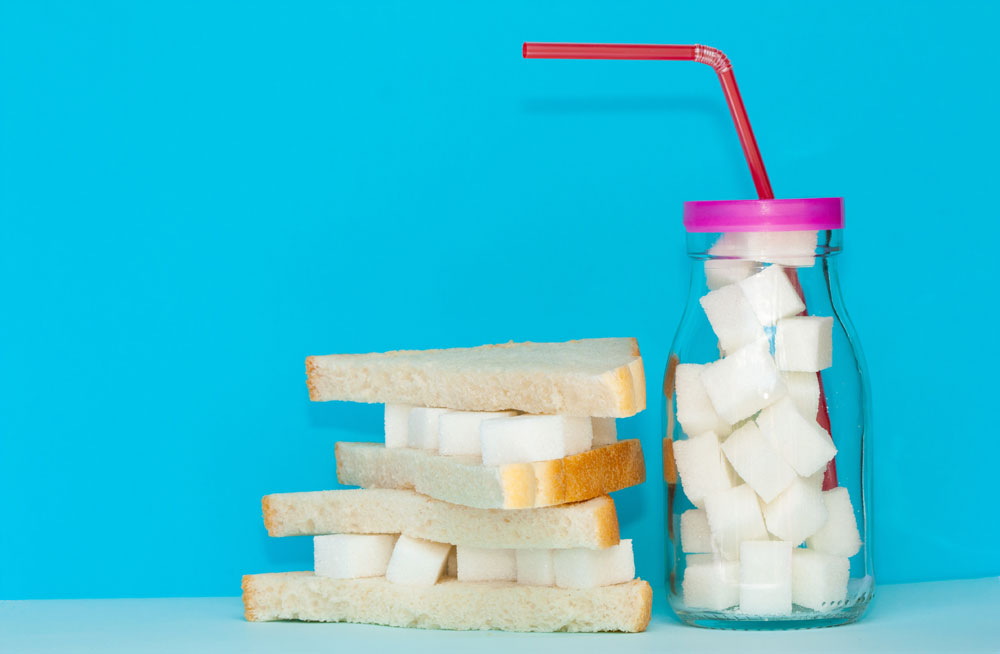There are two types of sugars:
- Naturally occurring sugars such as those found in milk and fruit
- Refined (processed) sugars – added to desserts, drinks and candy, etc.
Here is a simplified analogy to help understand Sugar…. The body is one big chemical process, reactions occurring constantly to stimulate nerves, brain patterns, make neurotransmitters, digest food, keep us breathing and our heart beating. In order for our body to execute these reactions, we need to provide it with fuel. Our bodies are literally made of what we eat. When you put food or drink into your mouth, our body breaks it down and uses the tiny molecules to build muscles, bones, ligaments, skin, and so much more. If you are building a house and the contractor uses materials such as cracked bricks, damaged wood and oxidized metal, the structure of the house will not be nearly as strong or long-lasting as if they used high-quality materials. The same is true for the body. If it is given nutrient-dense food that it recognizes as natural, it can properly build and repair the body the way it is supposed to. If we provide the body with foods and drinks that are lacking nutrients and are highly processed, it has nothing to “work” with and slowly the body breaks down via injury, illness and disease. This does not only pertain to sugary foods, but poor-quality foods across the board.
Refined sugar is striped of nutritional value. Lacking nutrients to support the digestion system and chemical reactions – the body will steal (draw) from nutrient reserves – depleting the body.
Natural sugars include: maple syrup, raw honey and molasses and contain vitamins and minerals. But – sugar is sugar and too much can lead to and be linked to: high blood pressure, increased chronic inflammation, weight gain, disease, etc. All these conditions increase the chances of heart attack, stroke, brain fog, mood disorders, cancer, etc.
Control/avoid added sugars when you can. Make your own meals, read labels and avoid prepackaged foods.
Minimizing your sugar intake at meals allows room for that glass of wine or dessert.
Tips:
- Read your labels and ingredients
- Pay attention to serving size as rarely is a serving size just one per container
- Minimize sugar where you can control it: avoid sodas, Yerba Mattes, Arizona Ice Tea, etc. Drink water! Add lemon, lime, mint, etc.
- Reduce processed foods
- Be conscientious of condiments and really read the ingredients (especially at restaurants where condiments can be jacked up with sugar and salt)
- Have whole fruits or dark chocolate (70% or higher and make sure top ingredient is: Cacao)
- Eat meals every 3-4 hours to help balance blood sugar roller coaster and include complex Carbs (veges), protein and a healthy fat
- Don’t forget to include fiber in your diet
- Stay hydrated – flushes out toxins
So in summary:
- KEEP IT SIMPLE
- CONTROL WHAT YOU CAN (home environment versus on the road)
- CREATE AWARENESS NOT SELF-SABOTAGE (notice how unhealthy foods make you feel versus healthy foods)
There are few things in life where we have a lot of control what happens to us, but the food we put into our bodies is something that is totally within our control. Making better choices in food has a significant impact on our level of health, emotionally, physically and spiritually and it doesn’t require expensive lab work, prescriptions, remedies or trips to the doctor. Removing sugar from your diet is not as easy as you think, because sugar is used as an additive for preservation and to make things more palatable. So it is basically found in most commercial foods. Unless you are living a health-conscious lifestyle and picking your food wisely, sugar is in your catsup, morning cereal, spaghetti sauce, soup, salad dressing, peanut butter, pancake syrup, bread, yogurt, you name it and it probably has sugar in it. They even put sugar in your salt. You must learn to read labels very carefully and make different choices when shop to decrease/eliminate sugar from your diet.
Credits:
Wise Wellness/Emilee Wise
HCI

